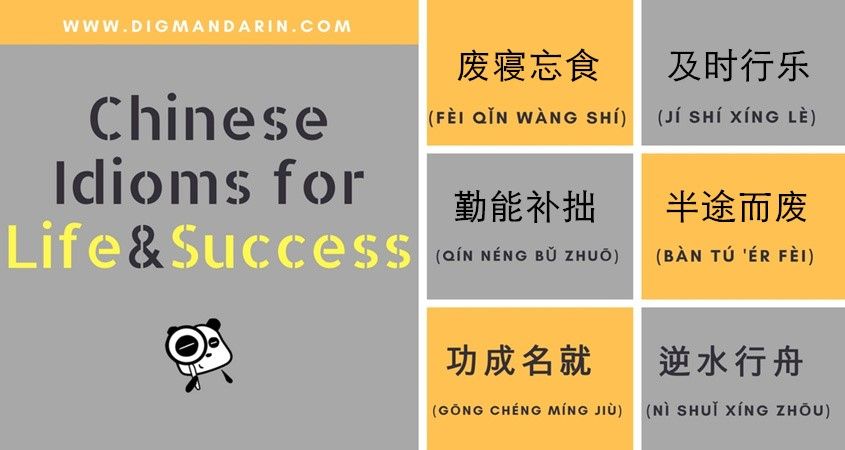Not so long ago, Mandarin Companion surveyed over a thousand Chinese learners worldwide. They discovered six main types of Chinese learners. What kind of Chinese learner are you?
You probably think that’s a rather broad question and rightfully so. In a previous post, I discussed learning styles and the concept of auditory and visual learners, in other words, HOW people learn Chinese. This post is about WHY we learn or what drives us to learn Chinese. All these motivations have finally been mapped out and reduced to 6 main categories. Let’s have a look.
01. Language enthusiasts
The primary driver for language enthusiasts is the enjoyment of language learning. For these learners it’s all about intellectual curiosity, the love for the language, without much regard for how to use them. A typical example would be a polyglot learner like Steve Kaufmann whose love of languages lead him to learn over 20 languages including Chinese. Or someone like “Uncle Hanzi”, an American physicist, who has been obsessed with the origin and history of Chinese characters for most of his life. The language enthusiast’s interest is usually more intellectual or even academic than practical.
02. Cultural connectors
Cultural connectors want to learn Chinese to be able to connect with Chinese culture. This can be anything from martial arts, Chinese cinema, literature, art to – I don’t know – Chinese electronics or street food. It’s not purely about culture of course, but also about people from that culture. A person that comes to mind is the famous YouTuber The Food Ranger whose obsession with Chinese street food inspired him to learn (basic) Chinese to be able to connect with the locals. Chinese culture (or street food) was his primary drive though.
03. Aspirational learners
Aspirational learners admire other non-native, Chinese speakers to such an extent that they want to equal them. I can’t think of an immediate example, but I’ve heard from several highly proficient, Chinese speakers that they were inspired by the legendary DaShan, one of the few western celebrities in China, whose Chinese skills are unparalleled among non-natives. I think that most serious Chinese learners have their personal “hero’s”. I personally admire the fluency of people like LeLe Farley and Afu, although I’ve never met them personally.
04. Functional learners
Functional learners didn’t necessarily plan to learn Chinese, yet have concluded that in their current environment their life will be easier if they do so. For example because of a job opportunity that required them to move to China and/or work with Chinese clients or partners. Functional learners are – in other words – sort of forced by the circumstances to learn Chinese. In many cases, they have fairly tangible language goals – anything from ordering noodles to be able to hold a presentation in Chinese.
05. Career-focused learners
Career-focused learners learn Chinese primarily to advance their career. For them the language is an opportunity, a key to a certain career path or just a big plus on the job market. They typically plan to work with China and Chinese people in the future.
When I studied in China I met other students from Vietnam, Thailand, Indonesia, several African countries, Kazakhstan, Uzbekistan and so on. Most of them were learning Chinese to have China-focused careers in the future, in business or tourism for example. In their eyes, China meant career opportunities and these prospects were their strongest motivation.
06. Obligated learners
The final category are the obligated learners. They learn Chinese because “they have to”. Maybe because they are required to learn a second or third language in school, their parents have them participate in a language immersion program or they are so-called “heritage learners”. In this case, their parents may expect them to learn to read and write Chinese characters. The crucial thing is that they’re not (completely) self-motivated.
I know some second generation Chinese people in Germany who fall in this category. On the one hand, they’re native speakers who are fully fluent, but to master the language equally to their peers in China they have to learn how to read and write. In most cases, their parents send them to special Chinese weekend schools or private tutors. Typically, the parents make a fuzz about getting their kids to read and write Hanzi, most kids don’t see the need, so I guess they can be called “obligated learners”.
Motivation and transition
So what type of Chinese learner are you? You’ve probably noted that it’s hard to fit into one single box. What’s more, the categories aren’t mutually exclusive, so you can be several things at once. A Language enthusiast and a cultural connector for example.
You can also evolve into a different type of learner over time, say from a functional learner to a aspirational learner and a cultural connector. For instance because you moved to China and had to learn at least survival Chinese (functional), but then you bumped into several fellow expats with outstanding Chinese skills and you felt the desire to be like them (aspirational) and also to connect with Chinese friends and locals (cultural).
Finally, it’s worth observing that some of these main types can be connected to certain life phases or life situations, for example the language enthusiast to the student or the cultural connector to the traveler. So they – again – are by no means fixed, after all we all change and so do our motivations.
Multiple learner types identification
Here’s a look at my own case: I identify with all categories, except for the “obligated learner”, and not to the same degree. When I met my wife (who’s Chinese) I became interested in Mandarin for the first time. Unfortunately, love isn’t a category. Let’s reconstruct:
- a part of me was a language enthusiast who always had an interest in languages. I even studied linguistics, so I surely was curious about Chinese and serious about it too.
- a part of it was functional: how could I communicate with her parents and Chinese friends?
- a part of it was “cultural connecting” and connecting with Chinese people. Also I developed an interest in Chinese history, cinema and literature. This became part of my learning process.
- a part of it – later on – was career-focused. I decided to study Chinese and hoped to advance my career opportunities, open new doors etc.
- a part of it was aspirational. In the process, actually quite early on, I met two or three westerners who spoke Chinese almost native-like which made a big impression and encouraged me to aim high.
Nowadays, in a way, I returned to my starting point as a language enthusiast and cultural connector. “Career” isn’t a major factor anymore, although that might change in the future. You cannot step into the same river twice, it is said.
Conclusion
What benefits do these categorizations bring? Do they make you a better learner? I’m not sure. I guess their main purpose is orientation and self-knowledge. Maybe it’s somewhat similar to doing a (serious) personality test. Does this kind of introspection make you a better person? Probably not, but potentially yes. Because knowing who you are is the basis for improvement, can be the inspiration for change. It might also help you to relate to others.












